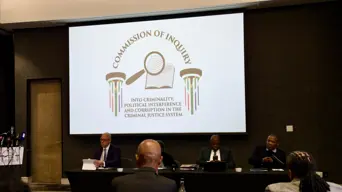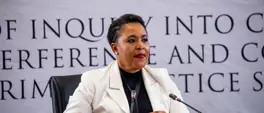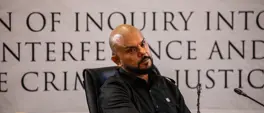SHIREEN SAID | Why judicial Commissions of Inquiry are important for the functioning of democracy
Shireen Said
6 August 2025 | 11:46'An often-overlooked aspect of Commissions of Inquiry is their role in raising public awareness about widespread corruption.'

The judicial commission of inquiry into corruption within the criminal justice system held a media briefing in Sandton, Johannesburg on 28 July 2025. Picture: Katlego Jiyane/EWN
There is a lot of commentary in the public discourse, following the decision of the President to establish the Madlanga Commission of Inquiry tasked to inquire into, report on and make findings and recommendations concerning whether criminal syndicates, including but not limited to drug cartels, have infiltrated or exert undue influence over our law enforcement and justice system.
Some people have criticised the decision of the president citing various reasons such as potential waste of taxpayers’ money and others questioning the effectiveness and rationality of Judicial Commissions of Inquiry in general.
It is important for members of the public to understand the nature and rationale for the establishment of Commissions of Inquiry. The first and the most critical reason being the obligation of the President to uphold, defend and respect the Constitution.
The founding values of our Constitution, underpinned by the Rule of Law principles, require a government that is open and responsive, accountable, transparent and collectively outlines the principles for public administration, requiring professionalism, efficiency, and responsiveness to people's needs, whilst also encouraging public participation in policymaking.
In establishing this Judicial Commission of Inquiry therefore, the President is legally obliged to uphold these constitutional principles.
The other important factor that should not be undermined is the fact that one hallmark of a constitutional democracy is a populace that is educated about its rights and responsibilities.
While South Africans possess a strong instinct to identify corruption and demand accountability, there remains a gap in engaging effectively with the systems designed for oversight. This is imperative to defend this constitutional democracy.
An often-overlooked aspect of Commissions of Inquiry is their role in raising public awareness about widespread corruption.
It is unavoidable that the impact of this Commission will be significantly shaped by media narratives throughout its duration, fostering critical discourse on the evidence presented and its implications.
In this regard, the public must be fully informed and engaged with the intricate workings of this commission and how its outcomes will impact on their livelihoods and wellbeing.
Commissions of Inquiry are integral to the political landscape of constitutional democracies, designed to uncover truths, expose systemic issues, and align governance with legal standards.
They also serve as vital “tools” in the “toolbox” for constitutional democracies designed to be swift, responsive and effective. They are legal mechanisms designed to hold public officials accountable through inclusive and transparent processes.
A Commission of Inquiry can make recommendations aimed at holding public officials accountable and restoring public trust in institutions. By their nature, these commissions play a significant role, providing essential insights into governance challenges and shaping responses to those issues. They are essential to strengthen the systems of governance and building open and accountable institutions.
One of the primary advantages of a Judicial Commission of Inquiry is its ability to operate outside the limitations of regular governance systems, including the judiciary.
These commissions are typically designed for efficiency, with clear timelines and the authority to summon witnesses and access documents. This capability is crucial for navigating the complexities of corruption and systemic challenges.
Their public accessibility fosters long-term accountability and keeps the public informed about the extent of corruption, reducing opportunities for coverups. A Commission's independence is vital for its credibility and legitimacy, as the appointment of impartial leadership is essential. This contributes towards integrity governance and helps restore faith in the criminal justice system.
By making constitutional principles more relatable and accessible, the public can better understand their roles within these processes, contributing to a more informed citizenry capable of holding governmental systems accountable. Ultimately, enhancing constitutional and governance literacy among citizens is crucial to combating corruption.
The sore point that is always cited as a drawback to establishing Commissions of Inquiry is the issue of cost, yet it is essential to contextualise this investment against the far greater costs of corruption, illicit financial flows, and organised crime. Proper funding will enable them to function expeditiously with the necessary independence, capacity, and efficiency required to uncover the truth, hold wrongdoers accountable, and make credible recommendations for reform.
Past experience has shown that well-resourced commissions have the potential to significantly transform governance, expose systemic failures, and guide institutional reforms.
The cost of inaction is likely to have far more damaging effects that will extend beyond financial loss affecting national security, social security and overall wellbeing.
The landmark case of Corruption Watch and Another v The Arms Procurement Commission has established a new legal framework for Commissions of Inquiry in South Africa, drawing from international best practices. Findings from such commissions can be challenged in court, ensuring that all evidence is scrutinised and validated.
Their public nature – where proceedings are often broadcast live and are widely reported on in the media – help to ensure transparency. It also presents an opportunity to leverage technology for enhanced public engagement with legal processes and constitutional rights.
What is indisputable is the fact that the public deserves a speedy yet meticulous process and the expeditious implementation of the findings of this commission will be critical to restoring faith in the criminal justice system.
The statistics are quite scary, and this process should contribute to getting the country out of the doldrums. For instance, South Africa currently scores 65.9 out of 100, ranking 4th out of 54 countries in Africa according to the Ibrahim Index of African Governance (IIAG). This score, while above the continental average of 49.3, reflects a decline in certain governance areas, particularly in rule of law and civic participation. T
The 2022 IIAG report indicates that from 2012 to 2021, South Africa experienced challenges that have eroded public trust in governance institutions. Furthermore, the 2024 Transparency International Corruption Perceptions Index places South Africa at a score of 41 out of 100, ranking it 82 out of 180 countries, highlighting ongoing struggles with public sector corruption.
A recent Human Sciences Research Council survey revealed that public trust in the police has plummeted to an all-time low of 22%, underscoring the urgent need for reform.
This Commission of Inquiry could be a pivotal moment for South Africa, elevating the discourse on governance and accountability and helping to address the deepening crisis in a justice system. As we navigate this pivotal moment, we must collectively garner all efforts to safeguard our constitutional democracy.
Advocate Shireen Said
Deputy Director General: Department of Justice and Constitutional Development
Get the whole picture 💡
Take a look at the topic timeline for all related articles.
















